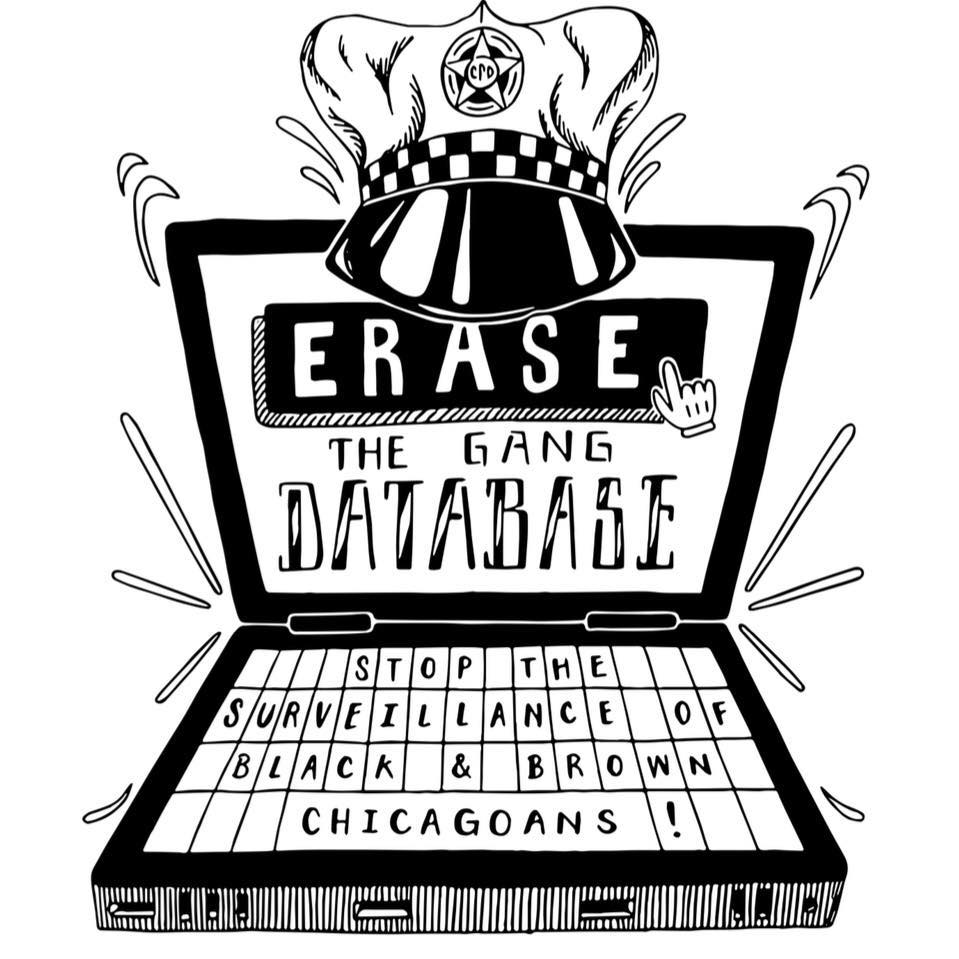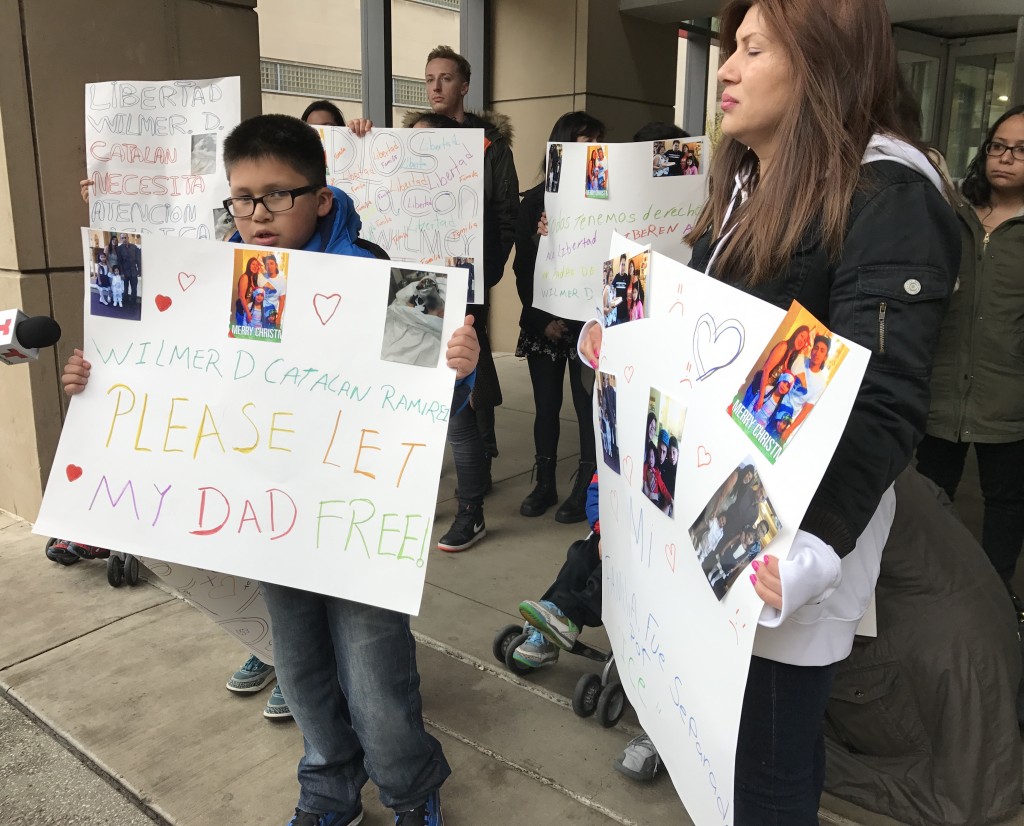[5/4/17] As part of the campaign to make Chicago a real sanctuary city, immigrant and Black-led groups file request for information from the City of Chicago, as start of campaign to expose the role of the gang database in criminalizing and deporting community members.
The request was filed on the same day that Wilmer Catalan-Ramirez, a Chicago man whose home was raided by Immigration and Customs Enforcement (ICE), filed a lawsuit naming the City of Chicago and the Chicago Police Department as responsible for sharing incorrect information with ICE that wrongfully identified Mr. Catalan-Ramirez as a gang member.
Immigrant rights and Black-led groups await the response from the city of Chicago after filing a Freedom of Information Act (FOIA) request regarding the Chicago Police Department’s gang database. The groups, Organized Communities Against Deportations (OCAD) and Black Youth Project 100 (BYP100), represented by the MacArthur Justice Center at the Northwestern Pritzker School of Law, filed the FOIA on Monday May 1st.
Some of the information requested includes:
- Sharing information with ICE: The policies of the city of Chicago on what information they share with immigration enforcement about people who have come into contact with Chicago police, such as their criminal record, names, addresses, or whether they are in the gang database. In addition, the number of individuals whose information has been shared with ICE;
- Maintenance and Accuracy of Data: Information on whether there are any processes to update, maintain, and check the accuracy of, information on whether individuals are part of a gang, as well as the policies and training for officers as to how they identify whether someone is part of a gang;
- Racial Demographics: Statistics on the race and ethnicity of people who are identified as being part of a gang by the Chicago Police Department or are part of the “Strategic Subject List,” a tool used to assess whether an individual’s criminal activities “are on the rise;”
- Due Process: Any existing policies on whether people can be notified of their inclusion in the Gang Database, Gang Book, or Strategic Subject List, as well as whether individuals can be removed or challenge their inclusion in these;
- Civil Rights Complaints: Any documents regarding civil rights investigations, internal or external, including complaints of racial profiling, sweeps, or unfair arrests.
The two groups, OCAD and BYP100, along with Mijente, have been leading a local campaign urging the city of Chicago expand what it means to be a “Sanctuary City” to protect immigrants and US born people of color, particularly those who are targeted by local police. Exposing and eliminating the gang database has jumped to the top of the agenda this week after it became clear that Mr. Catalan-Ramirez’s targeting by ICE was in part a responsibility of the Chicago police.
The organizations involved in the campaign issued the following statements:
“Every time that the Chicago Police Department shares information about any of us with immigration enforcement they are violating Chicago’s promise to be a Sanctuary City and to protect us from President Trump’s policies, said Rosi Carrasco, OCAD organizer. “The City of Chicago must look at how its policies not only criminalize people of color and feed us into Trump’s deportation machine,” she concluded.
“If Chicago is serious about real sanctuary and ending criminalization for all it’s residents, releasing this information is a minimal step towards that end,” said Janae Bonsu, BYP100 National Public Policy Chair. “The gang database has allowed for the rampant targeting of Black and Brown people in Chicago with no accountability for too long. We’re requesting these data as a first step towards bringing the functions of the database out of obscurity,” she stated.
“President Trump is going after our communities by using law enforcement to target, detain, and incarcerate us. As we are fighting for survival, we cannot tolerate ‘Sanctuary’ cities in name only. Exposing and tackling the gang database is both about protecting our families and our neighbors, and pushing Chicago to be an example for the country for what resistance and protection should look like,” stated Tania Unzueta, Policy Director at Mijente.
“Across the country Gang databases have proven to be a deeply flawed and sometimes unlawful law enforcement tool. Databases institutionalize racial profiling by targeting Black and Brown people, are over-inclusive and rife with inaccuracies. The public has a right to know how CPD is using public funds to administer these racist, problematic public safety strategies,” stated Sheila Bedi, attorney at the MacArthur Justice Center.
Below is the document that was filed at the Chicago Police Department FOIA office:
The organizers and their attorneys expect a response from the City of Chicago as early as next week. If records are not forthcoming the community groups and their counsel are prepared to file litigation to seek their release. In the meantime, they are advocating for the information to be released through conversations with the City and members of the Chicago City Council.
Organized Communities Against Deportations (OCAD) is an undocumented-led group that organizes against the deportation and criminalization of Black, Brown and immigrant communities in Chicago and surrounding areas (organizedcommunities.org)
Black Youth Project 100 (BYP100) is an activist member-based organization of Black 18-35 year olds, dedicated to creating justice and freedom for all Black people (www.byp100.org)
Founded in 1985, the Roderick and Solange MacArthur Justice Center is one of the premier civil rights law firms in the United States (law.northwestern.edu/legalclinic/macarthur)
Mijente is a national political home for Latinx and Chicanx grassroots organizing that comes out of the Not One More Deportation Campaign (www.mijente.net)

